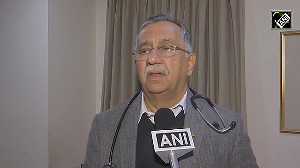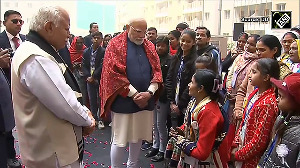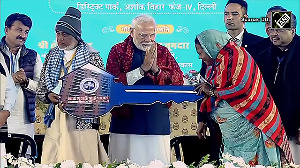Rao spends the better part of his time in Mumbai these days having moved on from MPhasiS, the technology firm that he founded.
The ex-Citibanker is busy with a new entrepreneurial effort affordable housing, which is what he thinks he'll be doing for the next ten years. Rao's also working on a new volume of poetry and though he's working on a novel, he hasn't been able to finish it
I can hear strains of Balamurali Krishna as I enter the sixth-floor apartment, and I envy anyone who can work from home.
Although brought up in the south - he studied chemistry at Loyola College in Chennai - Rao says he's as much a fan of Hindustani classical music as he is of Carnatic music.
Always keen to support new artistes - he played a key role in Citibank becoming a sponsor of classical music concerts - he asks me for names of some promising youngsters. Jayteerth Mevundi, I tell him, and he says he'll work on it. Since it's way past one, Rao suggests we eat and so we sit down to a meal of rotis, vegetables, rice, dal, raita and masoor pulao and lots of pickle, got from Grand Sweets in Chennai.
Rao's current obsession is affordable housing. The idea, he says, is to build small apartments of 250-350 square feet, catering for people with monthly income of between Rs 7,000-20,000, whether drivers or lift attendants, and currently living in slums or shanties.
Given the population at the bottom of the pyramid, he believes there should ideally be effective demand, but it's not necessarily a given.
For the idea to work, the accommodation can't be too far away from the place of work, the equated monthly installments (EMIs) can't be 10-15 per cent more than the rental that the family's currently paying and banks need to be convinced that they have creditworthy customers.
Thanks to the sub-prime crisis in the US, banks are more wary today than they've ever been, says Rao. But because they also need to do some amount of lending to the housing sector, they're willing to look at it if some of the risks can be boxed in.
Rao says the idea of affordable housing reminds him of Karsanbhai Patel and Nirma: How, in an interesting space, the entrepreneur defined a price point that didn't result in just a10 per cent increase in the market size but a tenfold increase.
"If you get the price point right you can have an extraordinary growth because, at the end of the day, we are a poor country," he points out. Rao also recollects how in his childhood it was so rare to own a cycle. "I keep thinking of Brij Mohan Munjal and Hero cycles and how expensive cycles were in the '50s and then suddenly prices started dropping."
In the course of researching the project, Rao and his team have discovered that there are those who're not really keen to own a house but simply want to live in better conditions. "That's why we're also exploring a rental model. It's tough because states have rent control acts but we're looking at that too because there seems to be a demand for it."
The first couple of projects are taking off in the outskirts of Bangalore but Rao doesn't mind the trips. They give him a chance to spend time with daughter Sanjivani who, after a stint with Citibank in the US, is now into microfinance. And to catch up with friend Ramchandra Guha with whom he enjoys discussing politics.
"I am, as you know, conservative, and Ram claims he's centrist but I think he's leftist," he says in jest. Rao's a big fan of Indian history too - he enjoys Indologist David Shulman's works - and is currently reading a book on the Wodeyars of Mysore.
At present, he's also working on a new volume of poetry, having already written about ten poems and hoping to write another 40 or 50. "These are religious poems and they're inspired by the Tamil medieval poet saints, the Alwars and Nayanmaars, who visited temples like Srirangam or Tirupati and composed poems," says Rao who adds that his poems are also inspired as much by TS Eliot's 'Ash Wednesday' or Francis Thompson's 'Hound of Heaven'.
Are you a believer, I ask. "One is always a believer and one is also a non-believer. I like going to temples in the south and it's not purely as a tourist with an interest in the architecture and sculpture, but also as a pilgrim." Given that he loves understated English prose and is a big fan of Amitav Ghosh, how is it he's not written a book yet ? Isn't it more lucrative these days with Indian authors commanding dollar advances? Rao laughs. "I'm happy with rupee royalties," he says, offering me some kaju katli and khajur barfis.
Since it has stopped raining, we go upstairs to the terrace from where one can have a wonderful view of the neighbourhood and Mani Bhavan. I ask Rao how he feels about all the opposition to collection agents, a trend that was actually started by Citibank in the early days of consumer finance.
"Well, India didn't have a system of collection companies, so we had to create that ecosystem. Some of the collectors go overboard and that brings bad publicity which you have to learn to deal with. But we should be careful because if you eliminate collection then nobody will repay, and if nobody repays, nobody will lend, and it's the less affluent who will be hurt. We need to be careful with loan write-offs because then anyone who pays thinks he's a fool."
For his own housing venture, Rao's making sure the downside is protected. "Our downside is low because we sell as we build and, if we can't sell, we just stop building. Of course, the key to success is completing a project on time because the longer we take, the lower the returns." Rao's obviously looking forward to the challenge, and he's determined to make it work.







 © 2025 Rediff.com -
© 2025 Rediff.com -